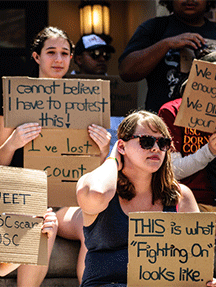By Madeline Vuong
Annie Elizabeth Clark graduated Phi Beta Kappa from the University of North Carolina Chapel Hill in 2011 with degrees in women’s studies and political science. “I wear my Phi Beta Kappa key and university seal pendant every day. I love UNC,” she said.
But in 2007—Clark’s freshman year of college—she was sexually assaulted. The university did not punish the perpetrator. Because Annie did not know her assaulter, the university said it would be impossible to punish anyone for the crime
Instead, administrators gave her a victim-blaming response. “They gave me this simile—that rape is like a football game and I should look back on it and ask myself what I would’ve done differently in that situation,” Clark said.
Shocked that the school that was supposed to support her gave her such a response, Clark started to look up UNC policy on sexual assault. Finding it vague and only sporadically implemented, she decided to take action herself to create a safer sexual culture on campus.
“Sexual assaults just weren’t taken seriously,” Clark said. “And the university was under-reporting these violent crimes.”
So Clark took a drastic step: She filed a federal complaint with the Department of Education against UNC along with another woman from the university, Andrea Pino, who contacted Clark after she was assaulted and then similarly mishandled by administrators.
In just a year, Clark has changed college and university policy on sexual assault nationwide.
“Our complaints were some of the first complaints about sexual assault that came completely from students,” Clark said. “Complaints at other universities were filed by external lawyers, but we were just 20-somethings, trying our best to study previous cases and read as much as we could so we would know what to do. We had no prior legal background.”
As she told her story, Clark was careful to point out that UNC’s treatment of sexual assault on campus was far from atypical. When she filed against UNC, she knew the case would be one that resonated with students on many campuses.
“The point was not to vilify UNC. After all, what was happening there was just a microcosm of something happening all across the country. But for me that was all the more reason to take action,” Clark said.
When Clark and Pino’s complaints became national news after the Department of Education decided to launch a federal investigation, other survivors started reach out to Clark. They told her the stories of how they’d been assaulted too. They told her they wanted help filing their own complaints.
Clark became an advisor to many survivors of sexual assault, co-founding End Rape On Campus and working closely with Know Your IX, two organizations that educate and advise students about their legal rights. She also directly assisted some students in filing complaints against their colleges.
“We’re making progress,” Clark said. But progress hasn’t come easily. “We received death threats,” Clark said. “Rape threats, too. Someone broke into Andrea’s [Pino] dorm and left a fake bloody knife after vandalizing her residence.”
Still, Clark didn’t give up. Instead, she continued to learn more about federal law. She continued to educate students and administrators about sexual assault. She reported the threats to the police. Thinking of all the women she wanted to protect from future assaults, Clark kept on.
“It wasn’t just because it happened to me. It was because it could happen to my friends at UNC. It could happen to my little niece, if and when she decides to go to college,” Clark said.
And in just a short amount of time, Clark has had a major impact. At her alma mater, sexual assault policy is being completely revamped by a special task force. Conversations about sexual violence have begun at universities all across the country.
“Even the President of the United States has taken action,” Clark said. Over the weekend, Obama announced the creation of a White House task force specifically to end sexual assault on campus.
“It was so exciting to see something that we’ve worked so hard for extend beyond academia,” Clark said.
In the future, Clark hopes to connect with more communities, like her peers in Phi Beta Kappa, to continue working to improve campus safety. “It’s time sexual assault is recognized as a real issue worth fixing,” she said.
Madeline Vuong is a senior at Williams College majoring in English and Women’s, Gender, and Sexuality Studies. Williams College is home to the Gamma of Massachusetts Chapter of Phi Beta Kappa.




